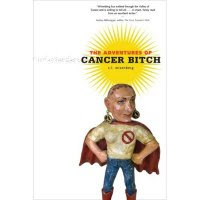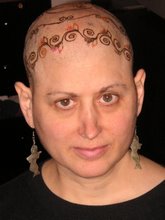
Cancer Bitch recommends that you do not ask this question. She has asked it twice in the last 2 years and it was awkward in the first case. So why did she ask it again? She is a slow learner.
In spring or summer of 2007, she greeted one of her husband's co-workers at a fundraiser by asking where his wife was. He said, I don't know, and Cancer Bitch quickly understood that something was amiss. She asked her husband L, Why didn't you tell me? and he said he'd just found out himself. L is never the bearer of good gossip; he doesn't ask enough questions. The co-worker and wife are still separated.
At the Kol Nidre service at the hippie congregation, the rabbi asked everyone to introduce themselves to their neighbors. The man in front of her turned and they realized they knew one another. One of Cancer Bitch's pre-Prozac boyfriends (read: angst-ridden relationship) was friends with this man, M, and Cancer Bitch would always talk to the wife L when they ran into one another. Cancer Bitch remembered the wife describing how she photocopied her dissertation at her husband's office and sent out copies of the manuscript to agent after agent. Or was it publisher after publisher? And it was published. L sang in Hebrew and Yiddish and had red-frame glasses and a New York accent. Her husband told C Bitch: She passed away. Four months ago.
After services M said that a year ago she'd had a seizure while singing in California and they'd found out that she had lung cancer that had gone to her brain.
She returned early to Chicago so she could sing on Yom Kippur with the hippies. She died at home, her sons sniging to her till the end.
Cncer Bitch had not heard, obviously. The family took out a paid notice in the New York Times, but not in the local papers. There is too much cancer-dying these days. There was L above; and K's wife E, who also had lung cancer; and the wife of another old boyfriend, after five cancer-free years; and her friend P's cousin is dying of ovarian cancer. There are heart problems and neurological damage and it seems that absolutely everyone is getting dental implants. This is middle age and it is only the beginning of the body's decline. Cancer Bitch has finally begun calling herself middle aged. For years and years she'd considered her mother to be middle-aged, but now that her mother is 81, she has to face facts. Sunday in Evanston Cancer Bitch walked past a house on Chicago Avenue north of Dempster and as always, remembered the time in 1980 when she went there to see about renting a room, and the guy there said that a cute Southern girl with a great accent was there first and he couldn't resist. She told this to her husband who said loyally, You were a cute Southern girl. She thinks about the Southern girl every time she passes the house but Sunday was the first time the memory was accompanied by a strong swoop of sadness: the passage of time. She thought of herself in her early 20s with her whole life ahead of her. The sadness of losing that feeling of potential. She doesn't regret her choices, except her many hours of wasting time, but she is no longer young, no longer just becoming, that's the point. Yeah yeah, there was Grandma Moses who started painting late in life, but there was also Mary McMarthy who told Cancer Bitch (in an interview in Florida) that people in their sixties and older couldn't write novels any more. She was referring to herself.
C Bitch has a novel in a file cabinet in the other room and in her computer and needs to gear gear up to revise and rework it.





















